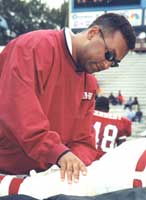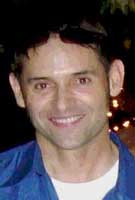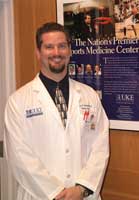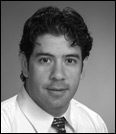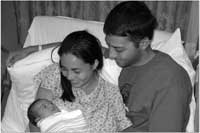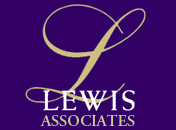


Lewis Associates e-Newsletter
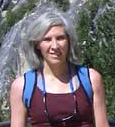 Volume
5 Issue 7
Volume
5 Issue 7
July 2006
Published by Lewis Associates. Dr. Cynthia Lewis, Phd., Editor
Email imaclewis@lewisassoc.com
with your comments. Enjoy!
What's inside:
Welcome to Success Stories Newsletter!
Important News: Record increase in allopathic entering class size; New Medical and Dental schools to open in the coming years
Useful Links: Internships Abroad; Service that can reduce debt
Alumni Updates: 7 Lewis Alumni now faculty at US Medical Schools; Liana Au has a baby; Chelsea Crist runs a marathon
Dates and Reminders: Criminal Background Checks for Allopathic and Osteopathic medical schools
Success Story of the Month: Michael Nevarez, Entering Class of 2006, Harvard Medical School
Question of the Month: How do I select a medical (health professions) school?
Welcome to Lewis Associates!
In July, many of my Advisees are heavily into the APPLICATION SEASON! For
those in the process of applying to medical school in the Class of 2007, the
MCAT exam scores are in and the decision has been made to hold the cards we
now have or to take the August exam. . . or possibly you have the DAT or the
GRE to take this summer. In any case, this is a very busy time for all pre-health
students.
Thanks from the President of the San Diego State University Pre-Physician
Assistant Society:
Dear Dr. Lewis,
"You were very gracious with your time and I really enjoyed your candid
answers to all of our questions. I wish that I had found you earlier in my
college career."
Thanks From Andrea Casillas, entering the Michigan State University
ABLE Program in fall 2006
"Dr. Lewis, Thank you so much. I am very grateful to have you along my
side during this stressful year. I appreciate all your work and patience!
I wish you the very best. May God bless you always. Thank you very, very much."
Andrea
Comment from an Alumnus
"Wow! What a website. Are you sure you want to retire? Based
on what I've seen, you have to be the most successful Advisor on the planet!
I owe a great debt of gratitude to your ability to encourage young people
to achieve their goals. If there is anything you ever need, no matter what
time of day, I'll take care of it, just call me. Joe"
Joseph E. Allen, MD, MS, FAAFP, CAQSM
Family Practice and Sports Medicine
What's New?
Long term Advising packages back by popular demand! Lewis
Associates will continue long-term advising for the next couple of years based
on overwhelming requests. We are also focusing on Personal Assessments, essay
and interview packages, our new Medical and Dental Residency essay package,
and hourly problem-solving advising.
NEW FREE teleconferencing and videoconferencing. You need
to register for free AOL Instant Messaging, and will get free audio and/or
video contact with us!! Talk with Zakiya to set up your computer for this
NOW!!
We now have e-billing and will have more online services. In fact, we will
establish an online Blog in the near future!
In a couple of years, some new books and CD's will be out by Dr. Lewis about
preparing for medical and other health professions schools. . . keep on the
lookout!!
Coming this summer--Last Chance!
July 22, 2006 we are hosting a gala Alumni Reunion in San Diego for
our over 700 alumni. We are trying to locate them now. If you have contact
information about any alumni, please email it to imaclewis@lewisassoc.com.
Our goal is to locate as many as possible. If you wish to be invited and you
are not an alumnus, but wish to meet some of our wonderful alumni, please
let Zakiya know in our office. We will try to include as many as we can on
a first-come basis.
Harvard Medical School Track Record
We are proud that 2 of our Class of 2006 applicants were interviewed at Harvard
Medical School this year and both are accepted! This brings Dr. Lewis' record
to 29 Advisees accepted to Harvard Medical and Dental Schools in the past
20 years!
100% of our Class of
2005 applicants were accepted!
100% of our Class of 2004 applicants were accepted!
Class of 2007 applicants
We are preparing for your applications to be submitted EARLY this summer.
We now have little time, a very precious commodity. We can help you sidestep
the mistakes and jump over roadblocks that everyone seems to face.
In order to be a competitive Class of 2007 applicant, you
need to submit a quality application as evaluated by your clinical, service
and other experiences and your GPA/MCAT/DAT/GRE, etc. profile--in a timely
fashion. This requires a well thought-out strategy to carry you through the
difficult year-long application process.
What are your chances?
If you want to change your career or reach your new career goal, but do not
know how to begin or how to jump over all those hurdles, Lewis Associates
will advise and implement strategies to change your life.
Getting Started
Read about your Personal Assessment in our newsletter
and website, then phone or email
us directly to get started! We spend on average 7 hours working to develop
an effective strategy of taking you from where you are to where you want to
be.
You may be like our other Lewis Associates Advisees--highly motivated and
intelligent, but needing focus, guidance and specific technical expertise.
Dr. Lewis solves problems for her Advisees and finds opportunities for them.
Maybe you wish to use our hourly advising to solve a specific problem.
Dr. Lewis is a trained biologist, having taught and directed her own research
programs for many years at two universities. She earned two postdoctoral fellowships
(one at NIH), received the 1990 NACADA Outstanding Institutional Advising
Program in the U.S. and directed her own Health Careers Opportunity Program
grant for 6 years, bringing $1 million to her university.
If you are serious about making your dreams to become a physician,
dentist, physician assistant, veterinarian, optometrist, podiatrist, naturopathic
physician, or pharmacist a reality--Lewis Associates can help you.
We have made the difference for over 700 alumni now practicing in medicine
during the last 20 years.
Dr. Lewis teaches Professionalism, Leadership, and Quality, and sets high
standards for her Advisees.
Lewis Associates will save you money and heartache on your application
process.
Contact the health career experts! For more information
email imaclewis@lewisassoc.com
or call 805-226-9669 and ask to set up your first appointment.
n e w s & l i n k s
N E W S
Entering allopathic medical school Class of 2005 tops 17,000 for biggest percentage gain since 1978.
The total number of applicants for the 05 entering class increased 4.6% from 35,735 in 04 to 37,364 in 2005. The number of first time applicants rose by 4%. And, 63 allopathic programs increased their class size. We will see what the changes are for the entering Class of 2006 this fall when those data come in. The bottom line is that there is a physician shortage in the US now and predicted for the near future, thus, medical schools are scrambling to respond to this need.
Two new allopathic medical schools will open for the Class of 2008
Florida International University
University of Central Florida
Osteopathic physicians
Currently are 6% of all physicians practicing, but are 10% of all new graduates. From the current 23 Osteopathic Medical School campuses, the prediction is there will be 4800 graduates annually by 2013.
New Osteopathic Medical Schools:
Open for Entry in Fall 2007
Touro College of Osteopathic Medicine, New York
Andrew Taylor Still College of Osteopathic Medicine at Mesa, Arizona
Fall 2008
Robert Morris College of Osteopathic Medicine, Pittsburgh
Pacific Northwest College of Osteopathic Medicine Yakima, Washington
Rocky Mountain College of Osteopathic Medicine in Colorado
Barry University College of Osteopathic Medicine in Florida
Southern Nevada College of Osteopathic Medicine
New Dental School opening 2008 - Arizona
CBT-MCAT update
· The cost will remain $210 to take the exam in 2006 and 2007.
· There will be 1/3 fewer questions with the same content proportionally as current MCAT
· Prometric sites may have only some of the total dates available--check EARLY for your sites! Registration is first come, first served.
· Headphones are available to block out exterior noise if one want them.
· The computer shuts off automatically for timing.
· The testing day will be 2 hours shorter than the paper exam.
· The essay writing sample will be typed into the computer.
· Scores will be available in 30 days starting in 2007.
· There will be 22 forms of the 2007 exam.
· The scores of the September 8 test in 2007 will be given by the October 15 deadline for applying to many schools.
· You can only register for one exam at a time; may take the exam 3 times in one calendar year.
· You must cancel 10 business days in advance and may be able to reschedule later, but there is no guarantee.
Essay
In your application essay for medical/other schools, you should describe your passion for whatever your future practice will be (your current idea of this future), e.g. rural health, urban disadvantaged, etc.
L I N K S :
Internships Abroad
You can search by country and area of interest which will link you
to info pages for each program that has links to different programs
www.internabroad.com
Students worried about Debt Encouraged to "Think Service!"
One of the many recommendations of the AAMC working group
on medical education costs and debt was to emphasize service as a means of
reducing educational indebtedness. There is a broad range of state, federal
and military programs.
www.aamc.org/studentdebt/
www.aamc.org/students/financing/repayment/start.htm
Find these and other useful links on Lewisassoc.com's
Links Page.
a l u m n i u p d a t e s
7 Lewis Alumni now faculty at US Medical Schools
| Dr. Lisa Hornberger,
UC San Francisco Was my top undergraduate research student at Pt Loma Nazarene University, co-authoring a paper with me. "I graduated from PL(N)C in 1985, did my medical school (1985-1989) and pediatric residency training (1989-1991) at UCSD. In med school I hooked up with Dr. David Sahn who was the chief of pediatric cardiology at UCSD at the time and turned me on to the world of fetal/prenatal cardiology (last part of my 1st year of med school)… UCSF has one of the most academically driven Peds Cardiology programs in CA and has the first and one of the strongest fetal treatment programs internationally. I direct the Fetal Cardiovascular Program and am a senior staff echocardiographer and cardiologist. I was fortunate to be promoted to Professor of Clinical Pediatrics in 2005. Ian Adatia, my husband, runs the Pediatric Cardiac Critical Care unit at UCSF and has published extensively in the fields of pediatric pulmonary hypertension and peri-operative management of the infant with congenital heart disease." |
| Dr. Jeffrey A. Guy
Jeff was my first Advisee accepted to Harvard Medical School in 1988. He taught me a lot about the Advising process! He apparently loved Harvard so much that he did research, residency and fellowships there--totaling 13 years.
Assistant Professor, Orthopedic Surgery |
| Dr. Larry McGlynn,
Stanford University Larry was the Coordinator for my HCOP grant at San Diego State University and attended Harvard/MIT for medical school
"I teach in the medical school at Stanford -- focus on neurology and psycho-pharmacology in those with HIV. It's challenging and fascinating." |
Jeff Bytomski, Duke
University
Clinical Associate of Family and Community Medicine and the Division of Orthopaedic Surgery; Medical Team Physician for Duke University; Director, Primary Care Sports Medicine Fellowship |
| John Chaffee Assistant Clinical Professor at the University of Washington. He entered Harvard Medical School 1988. |
| Dr. Adrian Miranda As I told Adrian, who was a student in my SDSU HCOP grant program, I have his Class of 1994 group photo on the wall in my office near my desk. I have seen him every day. . . for years. . . I am VERY proud of all his accomplishments!
"I graduated in 1994 from SDSU and went on to graduate
from Medical College of Wisconsin in 1998. In 2001, I completed my pediatric
residency at Children's Hospital of Wisconsin where I also completed
a 3-year fellowship in Pediatric Gastroenterology. As you may recall,
I was a bit hesitant to move to Wisconsin but it turned out to be a
great career move. I joined the faculty at MCW in July 2004 as a clinical
scientist (Assistant Professor) where I have benefited from great mentoring.
I just love my job! I see patients twice a week in my general Pediatric
GI clinic and once a week I perform procedures (endoscopies, colonoscopies,
liver biopsies, etc.). The rest of my time is spent in the laboratory
where I focus on animal models of visceral pain". |
Dr. Daren Wannamaker, Medical College of Georgia
Clinical Instructor of General Internal Medicine
| Baby Has Arrived, Liana Olszewski
Au Class of 2003 See also the July 2005 Success Stories Newsletter
"Aloha Everyone, |
| Chelsea Crist, Entering Class
of 2006
Chelsea ran the San Diego Rock and roll Marathon this summer. In its
ninth year, the race has live bands performing on stages at every mile
along the 26-mile course. |
d a t e s & r e m i n d e r s
Criminal Background Checks (CBC) for Allopathic and Osteopathic
medical schools
Acceptances can be rescinded on the basis of fraudulent application,
even after matriculation. You must advise during your application of all:
felonies, misdemeanors, adjudications, legal processes not yet concluded,
sex offenses, dishonorable discharges, etc. The school looks for a pattern
of behavior, crime against a person, information not disclosed at admissions,
and assurances that a student is seeking assistance. The student needs to
accept responsibility for the inciden and provide documentation about how
they addressed it.
This issue will again be revisited at application for residency, etc. It never
goes away. Your best bet is to NOT have any issue that meets the CBC criteria.
Truth is always the best defense. If you know there is "something"
to be found, pay to have your own CBC done prior to application.
s u c c e s s s t o r i e s
by Dr. Cynthia Lewis
Michael Nevarez, Entering Class
of 2006, Harvard Medical School
Entering Class of 2006, Harvard Medical School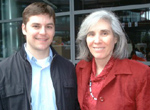
Michael was born in Santa Clara, California; his paternal grandfather immigrated from Northern Mexico (Chihuahua, Casa Grande) to New Mexico where his father was born, then worked in the copper mines, and finally moved to Mt. View, California for better work. His grandfather converted a chicken coop into a house, then built a home. Michael's father knew that he wanted a higher education, so he worked in fields and canneries to have a private HS education. His first language is Spanish and he earned a BA in business at San Jose State U, then was drafted into the army in Vietnam, returned to work as the Santa Clara County Appraiser, and is in insurance. Michael's mother was born in a Polish village near the Russian border and immigrated with her parents to the US after High School. She had a technical background in agriculture, and worked as a seamstress and at odd jobs; Polish is her first language. His mother is now a secretary in his father’s insurance business. Michael has an older sister who graduated in English, earned a PhD in comparative literature and is married and now teaching college.
English was spoken at home and is his first language. He learned some Spanish from his paternal grandfather and some Polish from his mother’s family. Michael was brought up Catholic and attended parochial schools; in HS he became connected to the campus ministry and the Truck of Love program where he saw community service as very important goal. In summer 98, he worked fulltime in Skagway, Alaska, as a luggage handler; and found it was fun living in a rural community. In summer 2001, he traveled to Turkey with his sister, and to Italy on his own.
Michael attended Catholic elementary school through 8th grade, with only 250 in the entire school. He began to visit convalescent homes with his class and enjoyed math and science. He got many ear infections, and by 3rd grade his grades dropped due to a hearing loss, which was fixed by inserting tubes. By 5th and 6th grades, school was not challenging and he became more engaged academically in 7-8th grades.
Michael attended a Catholic coed high school, taking some honors and AP classes. He took a Native American literature course in his senior year that got him really interested in Native American culture. He applied to several colleges and was accepted, selecting Cal Poly SLO, because he liked the practical curriculum and it was inexpensive. In his first year, he lived in the dorm and selected a business major although he was really exploring majors and took chemistry.
In his second year, Michael joined a social fraternity with other engineering students and became involved with the Student Community Services (SCS). He selected the EE major because he did well in it, enjoyed science and engineering classes, and liked problem-solving and the application of engineering in music technology. In spring 98, he was selected as SCS VP. In his 3rd year, he did running and basketball for fun. Michael decided that EE was more theoretical than he wanted and that science could be more applied, particularly in health.
In summer 1999, he worked fulltime at IBM in an internship in the hard test division coordinating a process on the assembly line. He found that many of the IBM engineers were not happy, thus he didn’t want to go into industry. In his 4th year, he decided to complete the EE major although he considered being premedical. He did his senior project at Agilent Technologies, writing a series of computer programs to analyze data for a machine. That year, Michael was also President of SCS. He looked for a job and was hired by Agilent in his 5th year. He graduated in spring 2001 with a strong GPA in EE and science.
From 9/01-12/03, Michael worked fulltime doing applications engineering as a memory tester for flash memory for Agilent Technologies. The first year, he did programming and the second year was managing design processes with a customer and some troubleshooting. In 03, he explored R&D programming classes at UC Santa Cruz, and he took a signal processing class at UC Berkeley due to his interest in music technology. By 1/04, he registered for classes at SJSU as a post-baccalaureate premedical student. He moved closer to Palo Alto VA hospital where he worked fulltime to support himself in summer and part-time during the academic year.
Clinical, Personal and Leadership Skills
In High School, Michael became very involved with the Truck of Love campus ministries: soup kitchen, visiting a mental care hospital, food and gift drives, Tijuana colonial house-building and set up a school for kids. He felt fulfilled by these activities, some of which serve communities in the SF Bay Area. As a HS senior, he visited kids and families at the Ronald MacDonald house, and worked there the summer after graduation, and had a special friend who died of leukemia.
Michael played JV and varsity football 2 years each as a cornerback/wide receiver, and basketball his freshman year, varsity track as a junior. He took Tae Kwan Do lessons for 1.5 years, learned to play electric guitar, and became interested in the electronics and technical recording aspects of music. He worked at sports camps in the summer as a counselor during HS, and was senior class senator.
Michael's real focus became the Tohono O’odham Indian Reservation summer camp in Southern Arizona, first as a counselor during HS in 1996 for 3 weeks, doing sports, crafts and cultural activities. In summer 1997, he worked at the camp, then most summers through 2001, and observed many psychosocial problems on the reservation. In summer 02-03, he took vacation from his job to work on the Indian Reservation. In summer 04, he became the a co-director at the camp and has done so through to the present. He maintains their website and helps raise funds for the camp, and has designed the science curriculum and teaches the lessons.
At CP SLO, Michael joined the Student Community Services (SCS) and initiated a youth education (tutor service at a local elementary school). In his second year, he was selected as Director of the Youth Education Project, managing 30 volunteers for after school homework clubs. He recruited, trained and coordinated the tutors and tutored also. He found that he was a good teacher and developed confidence in his leadership abilities. In his 3rd year, he volunteered in all the SCS projects 10 hr/wk as VP and became President in his 4th year; primary goals were diversity awareness and reflection by the members to enhance their volunteer experience (e.g., personal assessment).
In spring 00, Michael helped organize a service trip to Honduras after Hurricane Mitch; and worked in Nuevo Paradiso for single mothers and children. He was on the Team in Training and raised $3600 for Leukemia and Lymphoma research; finished Maui Marathon. He was awarded the Emerging Service Leader Award and President’s Award for Community Service at Cal Poly.
In summer 04, he shadowed Dr. Smith-Coggins in the Stanford ER at night and observed surgery with Dr. Howard; both physicians are role models. He volunteered with the Santa Clara Hospice for 2 years.
Research
In summer 04, Michael entered a neuroscience sleep study 20 hr/wk sponsored by Stanford. The study gathers data among healthcare personnel regarding their sleep habits, performance and propensity for sleep. He coordinated scheduling, advertising and recruitment of subjects, ran study sessions, administered performance tests, placed EEG and EOG leads and programmed Excel to analyze data. He helped in writing a paper for publication for the Sleep Medicine Conference.
Why medicine?
Michael got many ear infections as a child, and by 3rd grade he had tubes put in his ears and regained most of his hearing (from 40% loss to 10% loss). When he was about age 11, his babysitter (age 18) died of a brain tumor, and a teacher died from cancer. He started to think about the silent disease (cancer) that killed people. When he graduated from HS, he liked math and science, and selected engineering, but really did not know what he wanted for a career. His math teacher encouraged him in business and engineering. His work with the summer camp on the Tohono O'odham reservation in Arizona and volunteer work in Mexico made him seriously consider the need for health care workers in disadvantaged communities like the reservation by 1999. In his 4th year of college, he met with the Premed Advisor and was intimidated by this process. He wanted to work with people, but not at the expense of collaboration (he did not feel a collaborative spirit with premedical students).
After working in a corporate job for a couple of years, Michael found that engineering was neither challenging nor fulfilling, and he missed working directly with people! So, in 2003, he resigned his engineering job to prepare for medical school even though he had survived 4 layoffs during the dot-com bust.
Michael believes that the personal fulfillment he feels helping people with health problems led him to the correct career, especially with his recent experiences of mentoring by ER and anesthesiologist physicians.
Strengths
Michael has a caring supportive family, and explored the engineering world from several vantage points. He is good at the organization and integration of information, problem solving, computer work and technical skills. He found through community service and clinical experiences that he wants to become a physician because medical work is most fulfilling.
He was a strong high school student, but didn’t know what he wanted for a career, although he selected one of the hardest majors and attended a rigorous university. Even with the distractions of a fraternity, he not only did well academically, but also took on big community service and leadership tasks. His post-baccalaureate science GPA is strong.
Michael enjoyed leadership in college by working his way to President of the SCS, and worked up to Co-Director of the Tohono O'odham Indian Reservation Camp over a 10 year period of commitment.
He has direct patient care experiences via shadowing and Hospice, and work in a clinical research project over 2 years.
Michael took the 4/05 MCAT and scored high, and submitted his AMCAS which was well thought through in June, 05. He further took biochemistry as a post-baccalaureate student to show he could do the difficult work and also to prepare for the MCAT and for medical school courses.
We worked diligently through the application year, ending with acceptances at 14 schools including: Harvard, UCSF, and Stanford, and selecting Harvard to enter in 2006. (see Question of the Month for Michael's school selection process!)
Email to Dr. Lewis if you wish to communicate about medical schools or other issues or to contact those profiled in Success Stories: drlewis@lewisassoc.com
q u e s t i o n o f t h e m o n t h
by Dr. Cynthia Lewis, PhD
How do I select a medical (health professions) school (this can be at the time you are applying or at the time you have been selected by several schools).
The answer really is different at these 2 different times.
1. When you are applying, you want to include all the schools that you believe are a reasonably good match for your GPA/MCAT (or other test) credentials coupled with your strengths and weaknesses in your leadership, clinical experience, service, etc. A good source of information is the Medical School Admissions Requirements book for your year of application. Of course, you may also include schools which your credentials do not match, but you want to apply there anyway (dream school, family lives there, know someone there who raves about the curriculum, etc.).
2. From this month's Success Story: Michael Nevarez's process for making a final selection from the many schools where he was accepted. Please note that this process really does vary with your personality.
Note: Michael selected Harvard Medical School.
Next month we will compare with another student's process.
The factors I'm considering in no order:
-Name/Prestige: I know this helps with residency and with future projects and positions years down the road (e. g., research grants, academic positions)
-Stress Level: A hard one to pin down at schools, but I try to get a feeling of how much the students are liking it and how supportive the faculty are. I like schools with pass/fail the first 2 years as well, I think it allows you to explore the other opportunities the school has to offer without worrying a whole lot with grades. The clinical years though I feel should be graded.
-Research: I want a school with numerous opportunities in different areas, because I think I may want to integrate research into my medical school career. The two main tracks I'm interested in are public health and psychological biology.
-Social consciousness: I want a school with faculty members who are dedicating their careers to social change through medicine and the underserved. There are few schools that truly exemplify this in my humble opinion.
-Price: a factor, but not a huge one. I'm not in it for the money and debt doesn't frighten me in the least.
-Clinical education: I want solid experiences during my rotations, because I want to find which area I'm most passionate about. I know there other schools like UW, which are great because they have adventurous rotations out in WWAMI land, but you may get assigned a small town clinic that isn't the best experience.
We will feature an important question each month. Please submit one that interests you for Dr. Lewis to answer. Send your questions to imaclewis@lewisassoc.com with Newsletter Question in the subject line.
lewis associates advising services
Lewis Associates specializes in personal, effective and professional
premedical advising and placement for traditional and non-traditional
applicants. Often, non-traditional students are older than 21 years
of age, career changers, international applicants or second-round applicants
for admission to health professions school.
Lewis Associates' services meet the needs of all types of students from
pre-applicants to applicants, including hourly advising support for
specific needs. Click
here.
contact
"It's never too late to be who you might have been."
If this is how YOU feel, then, maybe Lewis Associates is the place
for you. Lewis Associates provides Mentoring and Coaching through
the rigorous and often circuitous pre-health preparation and application
process. Other consultants may support programs like Law and Business
or graduate school -- not Lewis Associates. We are the experts in
Health Professions based on 23 years of a successful
track record.
Call or email today to set your first appointment!
805.226.9669 imaclewis@lewisassoc.com
Copyright 2009, Lewis Associates. All rights reserved. Please do not repost on any website without direct permission from Lewis Associates.
Please feel free to forward this newsletter to any friends, classmates, or colleagues you feel would find its contents beneficial.
